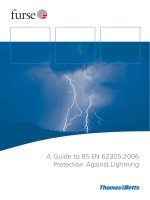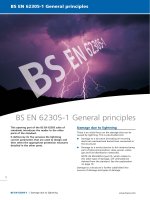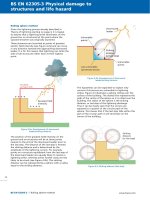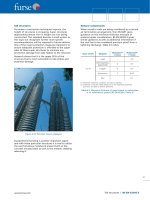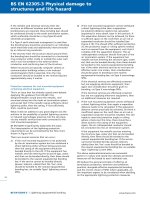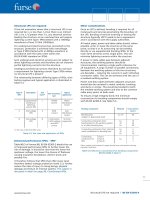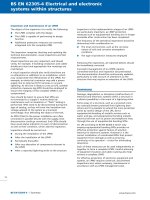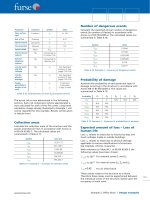Bsi bs en 00685 2007
Bạn đang xem bản rút gọn của tài liệu. Xem và tải ngay bản đầy đủ của tài liệu tại đây (357.22 KB, 10 trang )
BRITISH STANDARD
Licensed copy:PONTYPRIDD COLLEGE, 27/01/2008, Uncontrolled Copy, © BSI
Resilient, textile and
laminate floor
coverings —
Classification
The European Standard EN 685:2007 has the status of a
British Standard
ICS 59.080.60; 97.150
BS EN
685:2007
BS EN 685:2007
National foreword
This British Standard is the UK implementation of EN 685:2007. It supersedes
BS EN 685:2005 which is withdrawn.
The UK participation in its preparation was entrusted to Technical Committee
PRI/3, Textile floor coverings.
A list of organizations represented on this committee can be obtained on
request to its secretary.
This publication does not purport to include all the necessary provisions of a
contract. Users are responsible for its correct application.
Licensed copy:PONTYPRIDD COLLEGE, 27/01/2008, Uncontrolled Copy, © BSI
Compliance with a British Standard cannot confer immunity from
legal obligations.
This British Standard was
published under the authority
of the Standards Policy and
Strategy Committee
on 28 September 2007
© BSI 2007
ISBN 978 0 580 57953 0
Amendments issued since publication
Amd. No.
Date
Comments
EN 685
EUROPEAN STANDARD
NORME EUROPÉENNE
EUROPÄISCHE NORM
August 2007
ICS 59.080.60; 97.150
Supersedes EN 685:2005
English Version
Resilient, textile and laminate floor coverings - Classification
Revêtements de sol résilients textiles et stratifiés Classification
Elastische, textile und laminat-Bodenbeläge Klassifizierung
Licensed copy:PONTYPRIDD COLLEGE, 27/01/2008, Uncontrolled Copy, © BSI
This European Standard was approved by CEN on 26 July 2007.
CEN members are bound to comply with the CEN/CENELEC Internal Regulations which stipulate the conditions for giving this European
Standard the status of a national standard without any alteration. Up-to-date lists and bibliographical references concerning such national
standards may be obtained on application to the CEN Management Centre or to any CEN member.
This European Standard exists in three official versions (English, French, German). A version in any other language made by translation
under the responsibility of a CEN member into its own language and notified to the CEN Management Centre has the same status as the
official versions.
CEN members are the national standards bodies of Austria, Belgium, Bulgaria, Cyprus, Czech Republic, Denmark, Estonia, Finland,
France, Germany, Greece, Hungary, Iceland, Ireland, Italy, Latvia, Lithuania, Luxembourg, Malta, Netherlands, Norway, Poland, Portugal,
Romania, Slovakia, Slovenia, Spain, Sweden, Switzerland and United Kingdom.
EUROPEAN COMMITTEE FOR STANDARDIZATION
COMITÉ EUROPÉEN DE NORMALISATION
EUROPÄISCHES KOMITEE FÜR NORMUNG
Management Centre: rue de Stassart, 36
© 2007 CEN
All rights of exploitation in any form and by any means reserved
worldwide for CEN national Members.
B-1050 Brussels
Ref. No. EN 685:2007: E
EN 685:2007 (E)
Contents
Page
Foreword..............................................................................................................................................................3
1
Scope ......................................................................................................................................................4
2
Explanation of the classification system ............................................................................................4
Licensed copy:PONTYPRIDD COLLEGE, 27/01/2008, Uncontrolled Copy, © BSI
Annex A (informative) Examples of areas of use.............................................................................................6
2
EN 685:2007 (E)
Foreword
This document (EN 685:2007) has been prepared by Technical Committee CEN/TC 134 “Resilient, textile and
laminate floor coverings”, the secretariat of which is held by BSI.
This document shall be given the status of a national standard, either by publication of an identical text or by
endorsement, at the latest by February 2008 and conflicting national standards shall be withdrawn at the latest
by February 2008.
This document supersedes EN 685:2005.
Licensed copy:PONTYPRIDD COLLEGE, 27/01/2008, Uncontrolled Copy, © BSI
This document has been revised in order to be consistent with the latest version of the graphical symbols that
are defined in CEN/TS 15398:2006.
According to the CEN/CENELEC Internal Regulations, the national standards organizations of the following
countries are bound to implement this European Standard: Austria, Belgium, Bulgaria, Cyprus, Czech
Republic, Denmark, Estonia, Finland, France, Germany, Greece, Hungary, Iceland, Ireland, Italy, Latvia,
Lithuania, Luxembourg, Malta, Netherlands, Norway, Poland, Portugal, Romania, Slovakia, Slovenia, Spain,
Sweden, Switzerland and United Kingdom.
www.bzfxw.com
3
EN 685:2007 (E)
1
Scope
This European Standard specifies a classification system for resilient, textile and laminate floor coverings. The
classification is based on practical requirements for areas of use and intensity of use and is linked to the
requirements specified in the European Standard for each type of floor covering.
This European Standard is also intended to give guidance to manufacturers, specifiers and consumers to
enable them to choose the appropriate class of floor covering for any given area of use or specific room.
NOTE
The wear and appearance of floor coverings are influenced by standards of installation and maintenance, the
condition of the sub-floor and the kind of use (type of footwear, high concentrations of localized traffic etc.). These factors
should be taken into account when using this classification system.
Licensed copy:PONTYPRIDD COLLEGE, 27/01/2008, Uncontrolled Copy, © BSI
2
Explanation of the classification system
The different areas of use are specified in Table 1. The classes are logically based on intensity of use. In
Annex A, a list of examples is given for different areas of use. These examples are intended to explain the
definitions and the choice of correct class of floor covering.
NOTE 1
sufficient.
The specifier should decide whether a higher or lower class of floor covering than that recommended will be
NOTE 2
Apart from classification in respect to intensity of use, other properties should be considered and specified in
the manufacturer’s product specifications.
www.bzfxw.com
NOTE 3
The list of examples is neither complete nor typical for all countries. Upon implementation of this European
Standard appropriate examples can be chosen by the national standardization bodies of each country based on the
general guidelines given in Annex A. This will reflect practical requirements for areas of use and the different expectations
of performance and conditions of service for certain locations in the different countries. Exporters should carefully consider
the examples for areas of use chosen by the relevant importing country.
4
EN 685:2007 (E)
Table 1 — Classification
Class
Symbol
Level of use
Description
Licensed copy:PONTYPRIDD COLLEGE, 27/01/2008, Uncontrolled Copy, © BSI
DOMESTIC
Areas considered for residential use
21
Moderate/light
Areas with low or intermittent use
22
General/medium
Areas with medium use
22+
General
Areas with medium to heavy use
23
Heavy
Areas with heavy use
COMMERCIAL
Areas considered for public and commercial use
31
Moderate
Areas with low or intermittent use
32
General
Areas with medium traffic
33
Heavy
34
Very heavy
Areas with intense use
LIGHT INDUSTRIAL
Areas considered for light industrial use
41
Moderate
Areas where work is mainly sedentary with
occasional use of light vehicles
42
General
Areas where work is mainly standing and/or with
vehicular traffic
43
Heavy
Other light industrial areas
www.bzfxw.com
Areas with heavy traffic
5
EN 685:2007 (E)
Annex A
(informative)
Examples of areas of use
Licensed copy:PONTYPRIDD COLLEGE, 27/01/2008, Uncontrolled Copy, © BSI
Table A.1 — Classes and examples of areas of use
NOTE 1
sufficient.
Class
Examples of areas of use
21
bedrooms
22
living rooms, entrance halls
22+
living rooms, entrance halls, dining rooms and corridors
23
living rooms, entrance halls, dining rooms and corridors
31
hotels, bedrooms, conference rooms, small offices
32
classrooms, small offices, hotels, boutiques
33
corridors, department stores, lobbies, schools, open plan offices
34
multi-purpose halls, counter halls, department stores
41
electronic assembly, precision engineering
42
storage rooms, electronic assembly
43
storage rooms, production halls
www.bzfxw.com
The specifier should decide whether a higher or lower class of floor covering than that recommended will be
NOTE 2
Apart from classification in respect to intensity of use, other properties should be considered and specified in
the manufacturer’s product specifications.
NOTE 3
The list of examples is neither complete nor typical for all countries. Upon implementation of this European
Standard appropriate examples can be chosen by the national standardization bodies of each country based on the
general guidelines given in Annex A. This will reflect practical requirements for areas of use and the different expectations
of performance and conditions of service for certain locations in the different countries. Exporters should carefully
consider the examples for areas of use chosen by the relevant importing country.
6
Licensed copy:PONTYPRIDD COLLEGE, 27/01/2008, Uncontrolled Copy, © BSI
www.bzfxw.com
blank
BS EN
685:2007
BSI — British Standards Institution
BSI is the independent national body responsible for preparing
British Standards. It presents the UK view on standards in Europe and at the
international level. It is incorporated by Royal Charter.
Revisions
British Standards are updated by amendment or revision. Users of
British Standards should make sure that they possess the latest amendments or
editions.
It is the constant aim of BSI to improve the quality of our products and services.
We would be grateful if anyone finding an inaccuracy or ambiguity while using
this British Standard would inform the Secretary of the technical committee
responsible, the identity of which can be found on the inside front cover.
Tel: +44 (0)20 8996 9000. Fax: +44 (0)20 8996 7400.
BSI offers members an individual updating service called PLUS which ensures
that subscribers automatically receive the latest editions of standards.
Licensed copy:PONTYPRIDD COLLEGE, 27/01/2008, Uncontrolled Copy, © BSI
Buying standards
Orders for all BSI, international and foreign standards publications should be
addressed to Customer Services. Tel: +44 (0)20 8996 9001.
Fax: +44 (0)20 8996 7001. Email: Standards are also
available from the BSI website at .
In response to orders for international standards, it is BSI policy to supply the
BSI implementation of those that have been published as British Standards,
unless otherwise requested.
Information on standards
www.bzfxw.com
BSI provides a wide range of information on national, European and
international standards through its Library and its Technical Help to Exporters
Service. Various BSI electronic information services are also available which give
details on all its products and services. Contact the Information Centre.
Tel: +44 (0)20 8996 7111. Fax: +44 (0)20 8996 7048. Email:
Subscribing members of BSI are kept up to date with standards developments
and receive substantial discounts on the purchase price of standards. For details
of these and other benefits contact Membership Administration.
Tel: +44 (0)20 8996 7002. Fax: +44 (0)20 8996 7001.
Email:
Information regarding online access to British Standards via British Standards
Online can be found at />Further information about BSI is available on the BSI website at
.
Copyright
Copyright subsists in all BSI publications. BSI also holds the copyright, in the
UK, of the publications of the international standardization bodies. Except as
permitted under the Copyright, Designs and Patents Act 1988 no extract may be
reproduced, stored in a retrieval system or transmitted in any form or by any
means – electronic, photocopying, recording or otherwise – without prior written
permission from BSI.
BSI
389 Chiswick High Road
London
W4 4AL
This does not preclude the free use, in the course of implementing the standard,
of necessary details such as symbols, and size, type or grade designations. If these
details are to be used for any other purpose than implementation then the prior
written permission of BSI must be obtained.
Details and advice can be obtained from the Copyright & Licensing Manager.
Tel: +44 (0)20 8996 7070. Fax: +44 (0)20 8996 7553.
Email:

